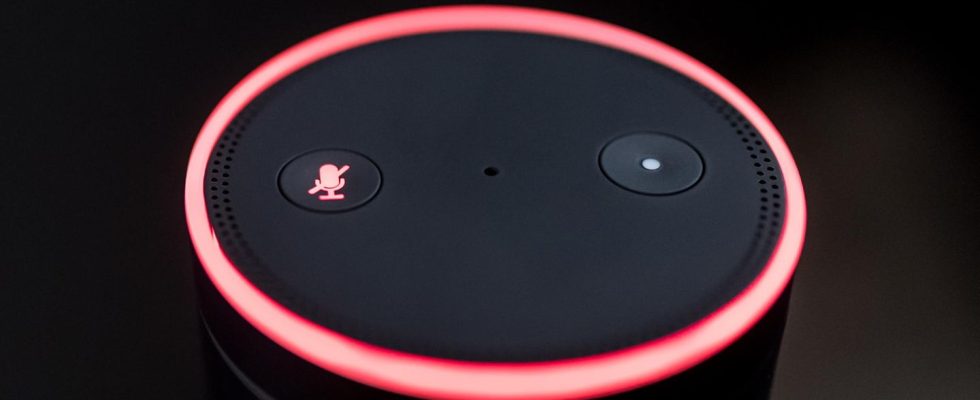Is this the last chance?
Amazon’s Alexa is finally supposed to make money – but disaster is already on the horizon
Amazon’s Alexa was supposed to inherit the computer
© Alexander Heinl/ / Picture Alliance
At the start, Amazon had high expectations of Alexa – also financially. So far, however, the voice assistant has been a money grab. A new concept should now fix it. But even the employees expect a catastrophe.
It was supposed to be the next computer revolution after the smartphone: Instead of being tied to screens, we would soon only be talking to the voice assistants listening everywhere, Amazon enthused in the early days of its Echo and the built-in Alexa. But the real breakthrough didn’t happen – especially financially. Now a subscription model should finally make Alexa profitable. But there is obviously a big disappointment looming.
This is reported by “Business Insider”, citing several internal sources in Amazon’s Alexa team. According to the report, a payment model is the company’s last hope of finally converting the Alexa division’s gigantic loss into a plus. But although there is already a planned launch date of June 30th, the subscription model called Alexa Plus is apparently highly controversial internally for several reasons. Many employees therefore expect a resounding failure.
Basic problem Alexa
The most important reason for this fear is the core of the project – namely the voice assistant Alexa itself. In order to justify a subscription, you don’t want to use the previously known version of the voice AI for Alexa Plus, but a completely revised one. The version called “Remarkable Alexa” is not only intended to understand and process complex queries much better, but also, unlike its well-known predecessor, to be able to have real conversations with users.
So far, however, this has apparently only been successful to a lesser extent than hoped. The new version, which is currently in a test run with 15,000 randomly selected Alexa accounts, is said to be significantly better in practice at having conversations with users and being able to process the desired information or instructions. Nevertheless, according to the employees’ report, she continues to disappoint.
AI misfires
Many of the problems are also known from other voice AIs. The new Alexa model is supposed to regularly invent facts when answering questions. These false claims, known as “hallucinations,” also plague ChatGPT and other models. In addition, the new Alexa should simply avoid questions or answer them in unnecessary detail. In an area that already bothers users of the old Alexa, the new version does not help: If you want to give several commands in one sentence at the same time, the new Alexa has to work too. As an example, the report cites switching on lamps and listening to music at the same time.
But a much bigger problem could be that the new Alexa is not better in every respect than the old version, now known as “Classic Alexa”. The group initially planned to build on the basis of the old model and only expand it with new capabilities. According to the sources, this could not be implemented; the new Alexa was rethought from the ground up. However, this caused friction with the old Alexa team, who wanted to protect their work. However, Alexa is not supposed to have access to Amazon’s most exciting AI: The company is to build an extremely powerful voice AI under the name “Olympus”. However, it is unlikely to be ready for use by the planned start date anyway.
Who pays for Alexa?
But the internal dispute is even more fundamental. Many employees consider the idea of an Alexa subscription to be the wrong approach. Many doubt that customers would be willing to pay for smarter AI. After all, most Alexa device owners are likely to be subscribers to other Amazon services such as Prime or Amazon Music anyway. Paying extra to make Alexa better doesn’t seem very attractive.
In fact, the Alexa subscription is likely to be one of the company’s last hopes of monetizing its voice assistant. The company’s original plan failed resoundingly: Alexa was supposed to entice its users to shop by voice – and thus essentially make Amazon the standard shop for households. In practice, however, this was too complicated for many users, as the then Amazon boss Dave Limp said in an interview with in 2017 star admitted (you can find the interview here).
However, other possible sources of income such as subscriptions to Amazon Music were not sufficient to finance the horrendous costs of developing and operating the servers. At the end of 2022, Amazon pulled the ripcord for the first time: the budget for the Alexa division was drastically cut and many employees were laid off. Alexa had finally gone from being a beacon of hope to being a problem child (you can find out more here). Dave Limp left the company and has been running the space company Blue Origin, which belongs to his former boss Jeff Bezos, since last year.
The subscription model could therefore be a last hope for Alexa. The employees also fear this: “If this attempt doesn’t generate any income, Alexa will be in big trouble.”
Sources:Business Insider, Reuters


